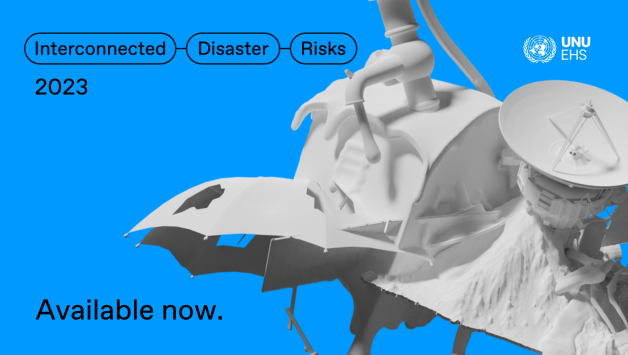
New UN University report warns about risk tipping points with irreversible impacts on people and planet
Bonn, Germany 25 October – A United Nations University report released today finds that drastic changes are approaching if risks to our fundamental socioecological systems are not addressed.
The Interconnected Disaster Risks report 2023 published by the United Nations University – Institute for Environment and Human Security (UNU-EHS) warns of six risk tipping points ahead of us:
- Accelerating extinctions
- Groundwater depletion
- Mountain glaciers melting
- Space debris
- Unbearable heat
- Uninsurable future
Systems are all around us and closely connected to us: ecosystems, food systems, water systems and more. When they deteriorate, it is typically not a simple and predictable process. Rather, instability slowly builds until suddenly a tipping point is reached and the system changes fundamentally or even collapses, with potentially catastrophic impacts.
A risk tipping point is defined in the report as the moment at which a given socioecological system is no longer able to buffer risks and provide its expected functions, after which the risk of catastrophic impacts to these systems increases substantially. These diverse cases illustrate that risk tipping points extend beyond the single domains of climate, ecosystems, society or technology. Instead, they are inherently interconnected, and they are also closely linked to human activities and livelihoods.
The analysis reveals that the cases share similar root causes and drivers which are embedded in our actions and behaviours that increasingly put pressure on our systems until they are pushed to the brink of collapse. Reaching these points means new risks will be introduced, many of which we do not yet know of.
The report does not just define and identify risk tipping points, but it also proposes a new framework to avoid or mitigate the consequences. Solutions fall into two categories: Avoid solutions, which target root causes and drivers of risk to avoid risk tipping points altogether, and Adapt solutions, which help prepare or better address the negative impacts of risk tipping points if they cannot be avoided.
The report finds that solutions being implemented today tend to focus on Delay rather than Transform, although increasing focus is being put on transformative change to achieve global goals on transitioning to a more sustainable future. It will require more game-changing solutions to move us away from a future of multiplying risk tipping points.
Transformative solutions will also require considerable societal and personal effort, and the report highlights overall changes we can each make to our behaviours and values.
“Real transformative change involves everyone,” said Sebesvari. “The report serves as a timely reminder before the UN Climate Conference that we must all be part of the solution.”
For more information visit https://ehs.unu.edu/
Interconnected Disaster Risks is an annual science-based report designed to be accessible for the general public. It is published by the United Nations University – Institute for Environment and Human Security, and was first released in 2021.
Based in Bonn, Germany, UNU-EHS conducts research on risks and adaptation related to environmental hazards and global change. The institute’s research promotes policies and programmes to reduce these risks, while taking into account the interplay between environmental and societal factors.